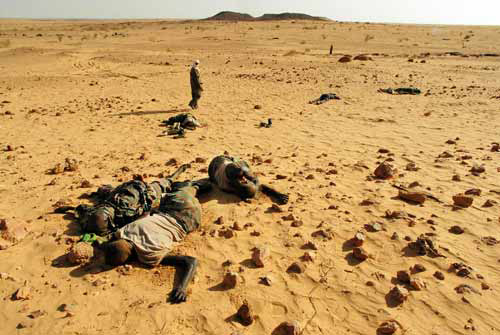 An interesting set of opeds in the New York Times from two important religious leaders, arguing opposite sides of the question: is it a good idea for the International Criminal Court to arrest Sudan’s president, Omar Hassan al-Bashir, on war crimes for fomenting genocide?
An interesting set of opeds in the New York Times from two important religious leaders, arguing opposite sides of the question: is it a good idea for the International Criminal Court to arrest Sudan’s president, Omar Hassan al-Bashir, on war crimes for fomenting genocide?
Tutu:
African leaders argue that the court’s action will impede efforts to promote peace in Darfur. However, there can be no real peace and security until justice is enjoyed by the inhabitants of the land. There is no peace precisely because there has been no justice. As painful and inconvenient as justice may be, we have seen that the alternative — allowing accountability to fall by the wayside — is worse.
The issuance of an arrest warrant for President Bashir would be an extraordinary moment for the people of Sudan — and for those around the world who have come to doubt that powerful people and governments can be called to account for inhumane acts. African leaders should support this historic occasion, not work to subvert it.
IN 2001 a hospital operated by my relief organization in the southern Sudanese town of Lui was bombed nine times by forces of President Omar Hassan al-Bashir. Two years later, I had what would be my first of three meetings with Mr. Bashir, now one of the most wanted men on the planet. When I confronted him about these attacks he was fully aware of them. After our meeting they stopped. Mr. Bashir is rightly accused of great cruelty and destruction. But I have been able to deal with him….
For all his faults, Mr. Bashir has demonstrated that he is able to cooperate. On several occasions he has complied with my requests. When a hospital we operated in eastern Sudan was seized by government forces, Mr. Bashir granted us limited access. Mr. Bashir also made television time available for us to broadcast a Christian program at Christmas and Easter.
The removal of Mr. Bashir will make it harder to negotiate an end to the crisis in Sudan. Ultimately, justice will be served by a power higher than the International Criminal Court. In the meantime, justice without peace would be a hollow victory.
It’s worth taking seriously anyone who, like Graham, has been on the ground for so long. And there’s no doubt that well-intentioned actions sometimes have unintended consequences.
But I’m concerned that most of the evidence Graham offers is how Bashir has treated him reasonably. Is it possible that Bashir went out of his way to be more concilliatory to Graham precisely because he knew the preacher’s influence in the United States?
As a theological matter, I remain unpersuaded by the argument that “Ultimately, justice will be served by a power higher than the International Criminal Court.” The likelihood of justice in heaven in no way absolves us of the requirement to seek justice on Earth.
